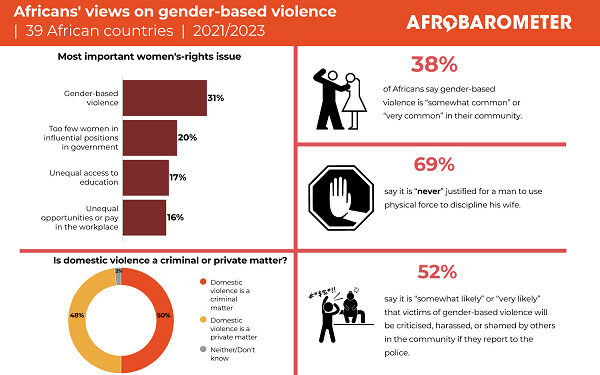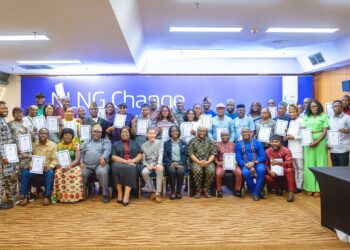Gender-based violence (GBV) ranks as the most important women’s-rights issue that Africans want their government and society to address according to the report from Afrobarometer in latest Pan-Africa Profile.
On average across 39 countries, almost four in 10 respondents say GBV is common in their community, though perceptions vary widely by country and demographic group.
The Afrobarometer survey findings reveal a mixed picture regarding GBV. While most Africans say that men are never justified in using physical force to discipline their wives, only half think domestic violence should be treated as a criminal matter that requires the involvement of law enforcement, while the other half consider it a private matter to be resolved within the family.
Similarly, while most Africans trust that the police will take reported cases of GBV seriously, more than half believe that women who report such crimes are likely to face criticism, harassment, or shaming from their community.
Africans’ perceptions of GBV vary widely by country and demographic group, suggesting that a woman’s fundamental right to safety depends at least in part on her location and circumstances.
Key Afrobarometer findings
Africans see gender-based violence (GBV) as the most important women’s-rights-related issue that their government and society need to address (cited by 31% of respondents), ahead of the scarcity of women in positions of power (20%) and inequalities in education (17%) and the workplace (16%) (Figure 1).
Perceptions of GBV as the top priority vary widely by country, ranging from just 5% in Mauritania to 69% in Cabo Verde.
On average across 39 countries, almost four in 10 citizens (38%) say GBV is “somewhat common” or “very common” in their community (Figure 2).
In nine countries, at least half of respondents say violence against women is a common occurrence, led by Angola (62%) and Namibia (57%). Poor citizens are more likely to report that GBV happens frequently.
More than two-thirds (69%) of Africans say it is “never” justified for a man to use physical force to discipline his wife (Figure 3).
But 31% consider a husband’s use of force “sometimes” or “always” justified, including majorities in eight of the 39 surveyed countries. Poor and uneducated citizens are particularly likely to endorse this form of domestic violence.
Africans are divided on whether domestic violence should be treated as a criminal matter (50%) or a private matter (48%) to be resolved within the family (Figure 4).
More than half (52%) of respondents say it is “somewhat likely” or “very likely” that victims of GBV will be criticised, harassed, or shamed by others in the community if they report to the police.
However, most citizens (81%) consider it “somewhat likely” or “very likely” that the police will take cases of GBV seriously.











